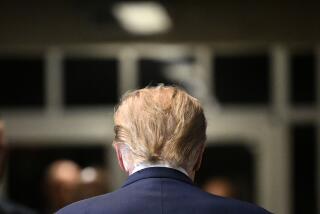Russian Court to Try the Communist Party : Justice: Gorbachev is asked to attend the ‘trial of the century.’ Some believe that a witch hunt could ensue.
- Share via
MOSCOW — Turning the tables on President Boris N. Yeltsin’s foes, Russia’s Constitutional Court on Tuesday scheduled the “trial of the century”--open hearings on the Soviet Communist Party’s bloody, checkered past--and asked the last general secretary, Mikhail S. Gorbachev, to attend to defend its actions.
Cautiously but clearly, Yeltsin’s top aides also began speaking publicly for the first time of the possibility of trying leaders and individual members of the former ruling party of more than 19 million members if evidence gleaned in the declassification of party archives shows they broke the law.
“In all civilized states in the world, criminal responsibility can be effected only for specific criminal acts committed by specific criminals, not by political parties or organizations,” said Mikhail Fedotov, one of Yeltsin’s envoys to the high tribunal.
“That is why, if evidence is unearthed about the characteristics of a crime that was committed, under current laws, charges will be brought and a trial held.”
Such prosecutions, which in theory could reach all the way to Gorbachev himself, could rapidly turn into witch hunts and would be an unpredictable, double-edged process in a country where the party rolls once included Yeltsin himself and many of his leading allies.
So far, criminal charges in Russian courts have been brought only against members of the State Emergency Committee and their confidants who unsuccessfully conspired to seize power in the Soviet Union last August. After the abortive coup, Yeltsin banned the Communist Party in Russia.
Oleg G. Rumyantsev, a Russian deputy who petitioned the Constitutional Court earlier this month to rule on the constitutionality of the party’s acts, vigorously opposed singling out individual Communists for trial as “overly dangerous.”
But in today’s Russian political context--in which pro-Yeltsin forces sense that die-hard Communists are strongly entrenched and gaining in strength--exposing the party’s misdeeds over its 73-year rule could be an effective way of snuffing out nostalgia for the simpler days of one-party rule.
“All the papers are filled with descriptions of how the democrats are now ruining the country,” Rumyantsev said in an interview outside the courtroom. “The Communists, supposedly, have clean hands. It’s time people were reminded and that the record was set straight.”
Sergei M. Shakhrai, another Yeltsin envoy to the tribunal, said that classified party archives under examination reveal the Communist hierarchy’s deep involvement in crimes ranging from “genocide against its own people” and international terrorism to fueling ethnic and class hatreds.
The Constitutional Court, meeting for only the second session in its brief history, had been asked by a group of Russian lawmakers, mostly Communists, to invalidate Yeltsin decrees of last Aug. 23 and Nov. 6 banning the party and confiscating its huge property holdings.
Yeltsin, the Communists and their fellow travelers claim, simply has no right as Russian president to outlaw a political party.
But the judges, attired for the first time in their Western-style black robes, voted 9-3 to join the Communists’ appeal with Rumyantsev’s 11th-hour petition that the court decide whether the party, because of the blatant, continuing illegality of its acts, was not an unconstitutional creature itself.
The court fixed the start of the hearings on both issues for July 7, to allow all parties time to prepare, and invited Gorbachev; his former No. 2 man in the Soviet party, Vladimir A. Ivashko, and the onetime leader of the Russian Communist Party, Valentin Kuptsov, to appear on the Communists’ behalf.
Ostankino state-run television called the upcoming session the “trial of the century,” because the Yeltsin entourage has made clear that it plans to document its sensational charges against the Communist Party, and some officials even equate the hearing with the Nuremberg trial of Nazi war criminals.
Ivashko and Kuptsov indicated that they will attend after unsuccessfully asking the high court to slap a moratorium on Yeltsin’s ban so party bodies could meet again and choose representatives for the trial.
But the hearings will go ahead whether Gorbachev and the other ex-party officials attend or not, the Constitutional Court ruled.
A spokesman for Gorbachev contacted Tuesday night left his leader’s options open.
“We are not planning our actions so far in advance,” Alexander A. Likhotal said by telephone from the private foundation now headed by the former Soviet president. “Gorbachev has been invited to attend the trial. But as far as I know, he has no intention of going. This is a legislative court, not a criminal one. Hence, Gorbachev has the choice of attending or not.”
The Communist petitioners were furious at first over the Constitutional Court’s decision to consider Rumyantsev’s 2-week-old petition, and they accused Yeltsin of rigging court procedure.
State Secretary Gennady E. Burbulis, the head of Yeltsin’s brain trust, rejected as “a lie” charges from the Communists of Russia faction that the Russian president had put pressure on the Constitutional Court.
But the way Rumyantsev’s petition was hastily accepted and melded with the Communists’ complaint was bizarre. Rumyantsev said he had been alerted to the publication May 12 of new constitutional amendments that empower the court to rule on the constitutionality of parties and other social organizations and that he formulated his petition in time to have it considered with the Communists’ appeal, which was accepted by the court Dec. 27.
The Nezavisimaya Gazeta newspaper, normally well-connected, said the significance of the court’s ruling means that it can now issue a compromise verdict holding that Yeltsin’s ban on the party is unconstitutional but also rule that the party committed such criminal acts since the 1917 Russian Revolution that it had no constitutional right to exist in the first place.
More to Read
Sign up for Essential California
The most important California stories and recommendations in your inbox every morning.
You may occasionally receive promotional content from the Los Angeles Times.













